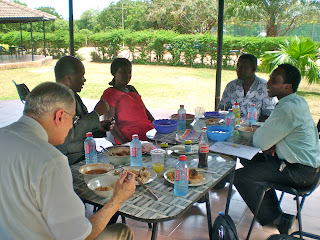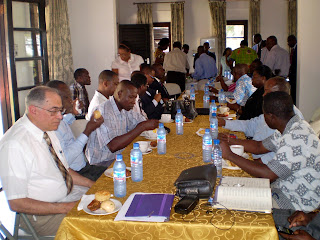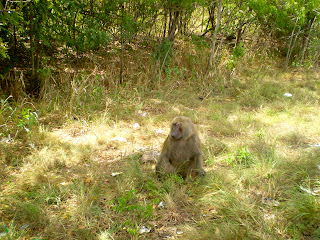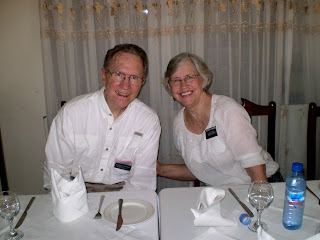So...after months of planning, our group of 17 arrived last Tuesday from USU. They were met at our apt by our Ghanaian students, except Ramatu who went to the airport with "Prof" to use her husbands influence to clear customs with all their med equipment and supplies. Our students here used their time while waiting at Alema Court to take a dip in our pool. After both the van and bus arrived we fed the weary travelers a snack and headed north towards the 13 villages, actually called Townships, and Abomosu.
(Rest stop)
Dad Jensen supervising Hunter's painting.
John and I borrowed the Klein's big truck and packed it to the gills with equipment and food for 30 people for 3 1/2 days.
We arrived after dark, after almost 5 hours driving, with the last few miles being the worst pot hole road we have ever been on in our lives! We stopped first at the lodge that World Joy has up there. I popped my ready made casseroles into the oven and fed everyone and we kept some students at the Lodge with us and sent the rest to the hotel in the village.
 The next morning we sent them off with an early breakfast and a sack lunch. Over the next few days they performed hearing screenings and fit hearing aids for villagers at a school and two churches. They painted a school for World Joy, distributed soccer balls, hiked through the jungle to see an isolated village that uses a BYU invented Merry go round to generate electricity, (check out the video below) and saw a cocoa plantation. Just before we left, our Doctor said, "Watch out for the Green Mamba snake in the jungle! We have no anti-venom and your life expectancy if bitten is about 30 min." Gee, thanks...
The next morning we sent them off with an early breakfast and a sack lunch. Over the next few days they performed hearing screenings and fit hearing aids for villagers at a school and two churches. They painted a school for World Joy, distributed soccer balls, hiked through the jungle to see an isolated village that uses a BYU invented Merry go round to generate electricity, (check out the video below) and saw a cocoa plantation. Just before we left, our Doctor said, "Watch out for the Green Mamba snake in the jungle! We have no anti-venom and your life expectancy if bitten is about 30 min." Gee, thanks... The students spent evenings at the Lodge eating and playing games. That was all very fine except we had a huge rainstorm the first day which knocked out the electricity (the generator picked up sometimes), and we had no running water til the last day. The students were good sports about hauling water to flush toilets, wash dishes, etc. There was no AC at all, and it is much warmer inland. All part of their Ghanaian experience.
The students spent evenings at the Lodge eating and playing games. That was all very fine except we had a huge rainstorm the first day which knocked out the electricity (the generator picked up sometimes), and we had no running water til the last day. The students were good sports about hauling water to flush toilets, wash dishes, etc. There was no AC at all, and it is much warmer inland. All part of their Ghanaian experience.
Heather's boys distributed some of the 80 soccer balls they brought, and there were some crazy impromptu games!
Well, we headed home Friday afternoon, and the driver decided to take a different way home. We grew to appreciate the earlier pothole road, because this new one was worse.
Sat morning we drove to the KorleBu hospital where the USU students presented training modules for the Ghanaian students and staff. We then fought horrible, unusual, weekend traffic trying to take everyone to the "pit" where the wood carvers are. With the Ghanaian students helping haggle over prices, we think everyone came away with good deals and lots of laughs.
 We attended church on Sun where we got to hear my cute Primary choir sing for Mother's Day. Afterwards, we made a quick stop at the Pink Hostel where the students are staying and then hit the road for Cape Coast, a 3 hour drive, but better roads. John and I checked into our "cabana" at the Gold Coast hotel and had a leisurely dinner at the ocean's edge. The students went to tour the Elmina slave castle and came home after dark.
We attended church on Sun where we got to hear my cute Primary choir sing for Mother's Day. Afterwards, we made a quick stop at the Pink Hostel where the students are staying and then hit the road for Cape Coast, a 3 hour drive, but better roads. John and I checked into our "cabana" at the Gold Coast hotel and had a leisurely dinner at the ocean's edge. The students went to tour the Elmina slave castle and came home after dark.
Monday morning we were up early, headed to breakfast and sent the students over to the Deaf School and new clinic built here by the Lion's club. They did hearing screening on students all morning, and then left on the bus to the Kakum National Park after lunch. We had been there already, so John and I decided to take the afternoon off.
Tuesday it was back to the clinic at the deaf school for more screenings of students and the community folks. In the last 2 days they have seen over 400 patients just at the clinic in Cape Coast. They saw at least 200 in Abomosu. There is such a crying need here in Ghana. Today we were joined by Derek from the Starkey Foundation and a young man, Jack, from Georgia who raised money for 150 hearing aids and traveled here with his Dad to help. John was interviewed 4 times by reporters from the Ghanaian TV and newspapers.
It was a successful trip (no overspeeding) and tomorrow we are off to our second deaf school. Better get some sleep.





















































